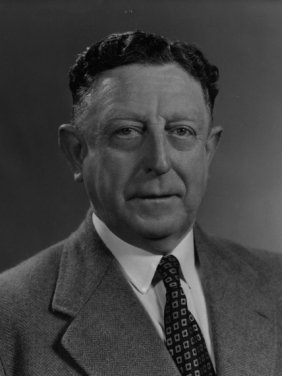Since writing the story of the `Takliwa' rescue I have the great pleasure to have been put in contact with the Captain's
daughter and nephew through the help of Frank Taylor, the only living survivor of this incident that I have been able to
find.
Captain Trimble's story of his experiences at sea would, I'm sure, be the basic material for an exiting novel. (From now
on I will refer to the Captain by his first name. I mean no disrespect but feel it has a friendlier feeling).
Born in Dalston near Carlisle on the 10th. February 1895 Robert Trimble grew to adulthood with a keen sense of
humour. He enjoyed life to the full and was a very popular and likeable person. After completing his education locally he
then joined the Conway Training Est. on the Mersey and eventually secured a berth with the British India Steam
Navigation Company where he gained rapid promotion to become their youngest ever Captain at the age of 30, an
almost impossible achievement in those days.
One time he showed a complete disregard for his own safety when as a young deck officer he dived overboard into shark
infested water to rescue a drowning seaman who had fallen into the sea. For this act of bravery he was awarded the Royal
Humane Society Bronze Medal in 1923.
During the war his ship, on route through the Indian Ocean, was torpedoed by a German Submarine. His ship sunk and
he was stranded on a life raft with other crewmen, including the ships doctor. For days they drifted with little or no water
and with the sharks getting so bold they even began to nudge the sides of the raft, but Robert and the doctor managed
to keep them at bay by hitting them with bits of floating driftwood. Sadly only Robert and the doctor survived this
tragedy and after their rescue spent several weeks in hospital suffering from sunstroke and severe sunburn. Recounting this
experience some time later to his family, Robert said that after the water ran out he kept his mouth moist by sucking on a
pyjama button.
Looking back on the Takliwa rescue I'm convinced that he (Robert) used great skill in beaching his burning vessel and
prevented the loss of many lives by getting as close inshore as possible, thus giving a slightly better chance for his
passengers and crew to gain the beach. Even so, it was still a fair way to swim. His daughter Rosemary recalls him how,
when he was in the water, he knew he was drowning and a deep sense of peace and calm swept over him. It was only
when his mind focused at a given moment on his breathing that he realized intuitively that if he did not come up for air
then all would be over. Suddenly he found himself struggling with all his strength to break through the waves that were
tossing and buffeting him relentlessly. Just when he felt his lungs had reached bursting point he broke the surface and
lived to tell the story.
After the war Robert carried on for several years with the merchant fleet in passenger and cargo liners (and I believe)
mainly in Far Eastern waters. On his retirement Robert and his wife Peggy went to live in Capetown South Africa. Sadly he
passed away on the 23rd. of December 1974. His funeral reflected his immense popularity in the overwhelming number
of people who attended, and in accordance with the wishes of the Captain his ashes were scattered on his beloved Indian
Ocean. This moving ceremony was conducted by the Port Authority.
|



